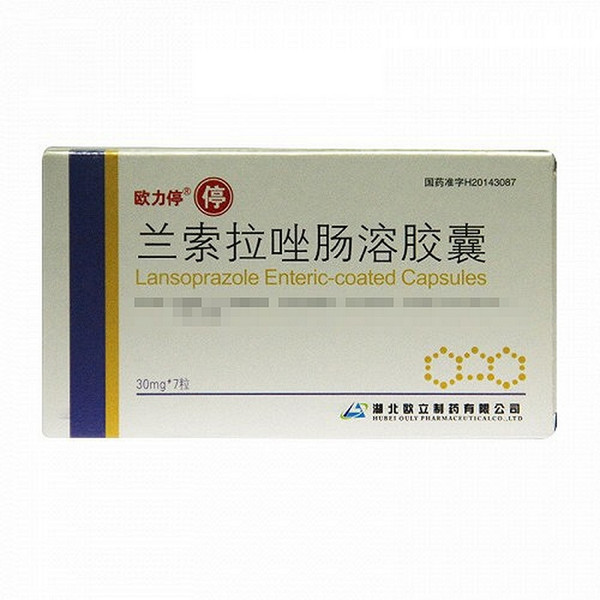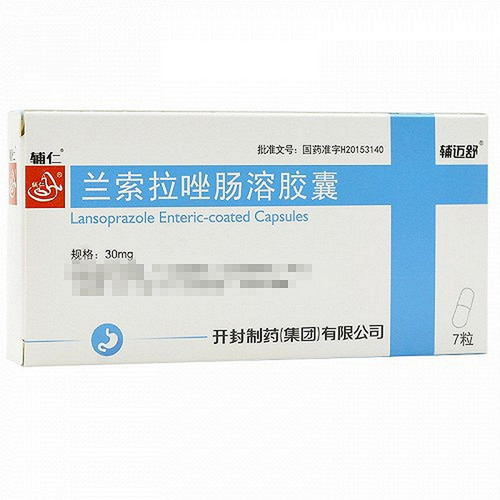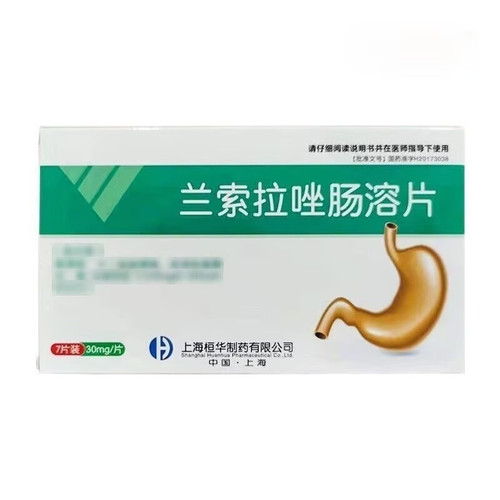Product Overview
[Drug Name]
Generic Name: Lansoprazole Enteric-Coated Capsules
Trade Name: Ouliting Lansoprazole Enteric-Coated Capsules 30mg x 7 capsules
Pinyin Code: OuLiTing LanSuoLaZuoChangRongJiaoNang 30mg x 7Li
[Main Ingredient]
Lansoprazole.
[Properties]
This product contains white enteric-coated spherical granules.
[Indications/Main Functions]
Gastric ulcer, duodenal ulcer, reflux esophagitis, Zollinger-Ellison syndrome, anastomotic ulcer
[Specifications]
30mg*7 tablets
[Dosage and Administration]
Adults are usually prescribed 30mg orally once daily. Patients with duodenal ulcers should take this medication for 4-6 weeks. Adults are usually prescribed 15mg-30mg of lansoprazole orally once daily for 4-6 weeks. For gastric ulcer, reflux esophagitis, Zollinger-Ellison syndrome, and anastomotic ulcers, take this medication for 6-8 weeks, or as directed by a physician.
[Adverse Reactions]
1. Hypersensitivity: Occasionally, rash and itching may occur. Discontinue use if these symptoms occur. 2. Hematology: Anemia, leukopenia, and eosinophilia may occur occasionally. Thrombocytopenia is rare. 3. Digestive system: Occasionally, there may be symptoms such as constipation, diarrhea, thirst, and abdominal distension. Occasionally, there may be an increase in GOT, GPT, AL-P, LDH, and n-GTP, so careful observation is required. If any abnormality occurs, appropriate measures such as discontinuation of the drug should be taken. 4. Psychoneural system: Occasionally, there may be symptoms such as headache and drowsiness. Insomnia and dizziness rarely occur. 5. Others: Occasionally, there may be symptoms such as fever, increased total cholesterol, and increased uric acid.
[Contraindications]
(1) Patients with a history of allergy to the ingredients of this preparation are contraindicated. (2) Patients currently taking atazanavir sulfate.
[Precautions]
1. The following patients should use the drug with caution: 1) Patients with a history of drug allergy. 2) Patients with liver dysfunction (resulting in prolonged drug metabolism and excretion time). 3) Elderly patients. 2. Important precautions: 1) During treatment, the patient should be fully observed and the minimum dose required for treatment should be used according to their symptoms. 2) Due to the lack of sufficient long-term experience, lansoprazole enteric-coated capsules are not recommended for maintenance treatment of gastric ulcers, duodenal ulcers, and anastomotic ulcers. 3) Maintenance treatment is limited to recurrent and recurrent reflux esophagitis. If patients treated with 30 mg/day or 15 mg/day experience long-term symptom relief and dose reduction or discontinuation does not result in relapse, the dose should be reduced to 15 mg/day or discontinued. Regular endoscopic follow-up is recommended during maintenance treatment. 3. Other Precautions 1) There have been reports of visual impairment with similar medications (omeprazole). 2) In an animal study, rats were force-fed 52 weeks of lansoprazole at a dose of 50 mg/kg/day (approximately 100 times the clinical dose), resulting in one case of a benign testicular Leydig cell tumor. In another study, rats force-fed 15 mg/kg/day or higher for 24 months showed an increased incidence of benign testicular Leydig cell tumors. Gastric carcinoids may develop in rats fed doses above 5 mg/kg/day. In addition, the incidence of retinal atrophy increased in female rats fed lansoprazole at doses exceeding 15 mg/kg/day and male rats at doses exceeding 50 mg/kg/day. However, testicular Leydig cell tumors and retinal atrophy were not observed in mouse tumorigenicity studies or toxicity studies in dogs and monkeys, so the aforementioned lesions are likely specific to rats. 3) Because this product can mask the symptoms of gastric cancer, gastric cancer must be ruled out before administration. 4) The safety of long-term use of lansoprazole enteric-coated capsules has not been established (due to a lack of experience with long-term medication). 4. Upon delivery: PTP-packaged medications should be removed from the PTP sheet before administration (there have been reports of accidental ingestion of the hard, sharp corners of the PTP sheet piercing the esophageal mucosa, leading to perforation and serious complications such as mediastinitis).








